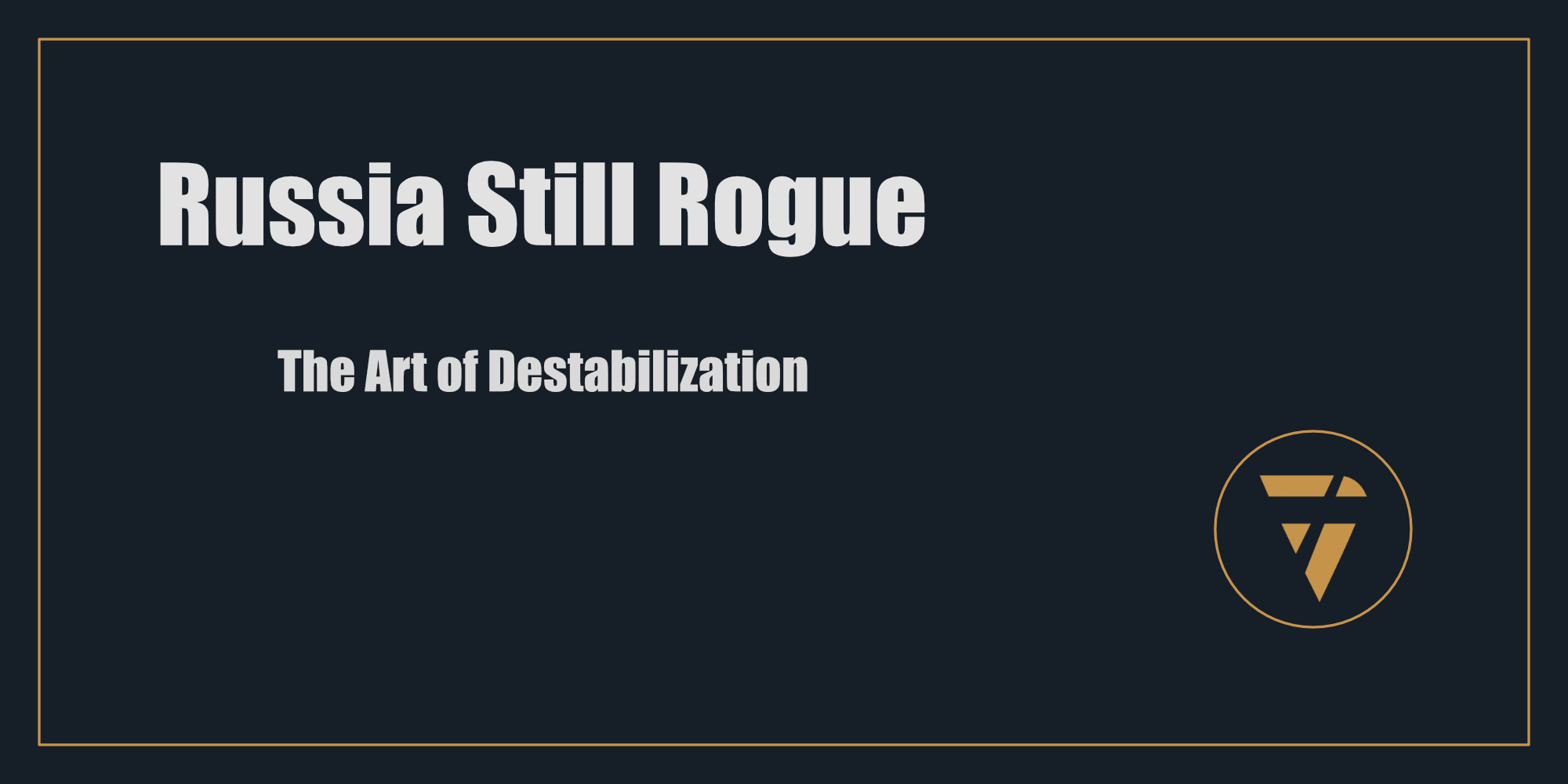Russia Still Rogue
The Art of Destabilization

What do you do when a declining power chooses chaos over co-operation? Russia’s status as a rogue state isn’t a phase, it’s a strategy. And the ripple effects will haunt global stability for years to come.
The Persistence of Instability
In Top Risks 2025, Russia’s enduring role as a rogue actor highlights a stark reality: it’s not simply a nation in decline; it’s a nation weaponizing its decline. With diminishing resources and an eroding economy, Russia has embraced unpredictability as its primary geopolitical strategy.
From fueling proxy wars and cyberattacks, to partnering with fellow disruptors like North Korea and Iran, Russia isn’t looking to win, it’s looking to destabilize. For the global order, this isn’t just a nuisance; it’s an existential threat to collective security, energy markets, and the norms that underpin international co-operation.
The Rogue State Playbook
Russia’s strategy as a rogue state operates on several key principles:
- Asymmetric Warfare:
With limited conventional military capacity, Russia leans heavily on cyberattacks, disinformation campaigns, and mercenary operations to weaken adversaries without direct confrontation. - Strategic Alliances with Chaos Actors:
Aligning with North Korea, Iran, and other outliers allows Russia to amplify disruption globally, from supplying weapons to undermining peace efforts. - Weaponization of Resources:
Russia uses its control over energy exports, particularly natural gas, as a lever to exert influence and punish dissenting nations, especially in Europe. - Eroding Institutional Trust:
Through propaganda and election interference, Russia sows division in democracies, undermining public trust in institutions and leaders.
This isn’t a strategy designed to win a conventional war, it’s one designed to make others lose faith in stability itself.
The Global Fallout
Russia’s actions as a rogue state have far-reaching consequences that extend well beyond its borders.
- Energy Market Volatility:
By leveraging energy exports as a geopolitical tool, Russia disrupts global markets, driving price spikes and creating uncertainty for energy-dependent nations. - Cybersecurity Risks:
Russian-backed cyberattacks target critical infrastructure, from power grids to hospitals, creating vulnerabilities that reverberate globally. - Polarized Alliances:
Russia’s rogue status forces nations into uncomfortable decisions, dividing the global order into fragmented camps and weakening collective responses to shared threats. - Prolonged Conflicts:
By fueling proxy wars in regions like Ukraine and Syria, Russia ensures that peace remains elusive, straining resources and lives far beyond the immediate theatres of conflict.
Why Russia Remains Dangerous
Russia’s decline as a global power doesn’t make it less dangerous, it makes it more so. Facing economic stagnation and demographic collapse, the Kremlin has little to lose and every incentive to act unpredictably.
For businesses and governments alike, this creates a landscape of chronic uncertainty. From supply chain disruptions to geopolitical risks, the cost of Russia’s rogue behaviour is paid by everyone.
Mitigating the Risks of a Rogue Russia
- Invest in Cyber Resilience: Strengthen cybersecurity infrastructure to protect against state-sponsored attacks targeting critical systems. Regular audits and proactive measures are essential.
- Diversify Energy Sources: Reduce dependence on Russian energy by investing in renewable energy and securing alternative suppliers. Energy independence is no longer a luxury, it’s a necessity.
- Monitor Geopolitical Hotspots: Stay ahead of risks by closely tracking Russian involvement in proxy conflicts and unstable regions. Understanding these dynamics can mitigate surprises.
- Strengthen Multi-lateral Cooperation: Push for stronger alliances and coordinated responses to rogue state behaviour. Collective action reduces the impact of destabilization efforts.
- Prepare for Market Volatility: Build contingency plans for disruptions in energy and commodity markets. Flexibility in sourcing and operations will reduce exposure.
The Cost of Chaos
Russia’s rogue state strategy thrives on the world’s inability to respond cohesively. It’s a reminder that even a declining power can wield enormous influence through disruption. For businesses, governments, and individuals, the challenge is to anticipate instability and build resilience.
How are you preparing for the ripple effects of a rogue Russia? Let’s explore strategies to protect your operations, investments, and future in an era of perpetual uncertainty.
This Substack is reader-supported. To receive new posts and support my work, consider becoming a free or paid subscriber.
This is what I’m working on. Tell me what you think, I enjoy the conversation! Subscribe and follow the work in real time.
Thanks!
B
Russia thrives on chaos—cyberattacks, energy blackmail, and proxy wars. It’s not about winning; it’s about destabilizing. Strengthen cybersecurity, diversify energy, and plan for volatility. In uncertainty, resilience is your best defence.
PS -





